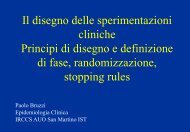- Page 1 and 2:
Abstract 230 - IMPIEGO DEI GLICOPEP
- Page 3 and 4:
Abstract 223 - VANCOMICINA IN INFUS
- Page 5 and 6:
5 10° CONGRESSO NAZIONALE SIMIT Ab
- Page 7 and 8:
7 10° CONGRESSO NAZIONALE SIMIT Ab
- Page 9 and 10:
9 10° CONGRESSO NAZIONALE SIMIT Ab
- Page 11 and 12:
11 10° CONGRESSO NAZIONALE SIMIT A
- Page 13 and 14:
Azithromycin R 2 Gentamicin S 1 Van
- Page 15 and 16:
15 10° CONGRESSO NAZIONALE SIMIT A
- Page 17 and 18:
17 10° CONGRESSO NAZIONALE SIMIT A
- Page 19 and 20:
19 10° CONGRESSO NAZIONALE SIMIT A
- Page 21 and 22:
21 10° CONGRESSO NAZIONALE SIMIT A
- Page 23 and 24:
23 10° CONGRESSO NAZIONALE SIMIT A
- Page 25 and 26:
25 10° CONGRESSO NAZIONALE SIMIT A
- Page 27 and 28:
Abstract 9 - SIEROPREVALENZA DELL
- Page 29 and 30:
29 10° CONGRESSO NAZIONALE SIMIT A
- Page 31 and 32:
Abstract 170 - MALATTIA DI LYME A B
- Page 33 and 34:
33 10° CONGRESSO NAZIONALE SIMIT A
- Page 35 and 36:
35 10° CONGRESSO NAZIONALE SIMIT A
- Page 37 and 38:
Abstract 144 - EPIDEMIA DI TRICHINE
- Page 39 and 40:
39 10° CONGRESSO NAZIONALE SIMIT A
- Page 41 and 42:
41 10° CONGRESSO NAZIONALE SIMIT A
- Page 43 and 44:
43 10° CONGRESSO NAZIONALE SIMIT A
- Page 45 and 46:
45 10° CONGRESSO NAZIONALE SIMIT A
- Page 47 and 48:
47 10° CONGRESSO NAZIONALE SIMIT A
- Page 49 and 50:
49 10° CONGRESSO NAZIONALE SIMIT A
- Page 51 and 52:
51 10° CONGRESSO NAZIONALE SIMIT A
- Page 53 and 54:
53 10° CONGRESSO NAZIONALE SIMIT A
- Page 55 and 56:
55 10° CONGRESSO NAZIONALE SIMIT A
- Page 57 and 58:
16 Legati al paziente 4 Non identif
- Page 59 and 60:
59 10° CONGRESSO NAZIONALE SIMIT A
- Page 61 and 62:
Nausea 24 % Rinorrea 21 % Congiunti
- Page 63 and 64:
63 10° CONGRESSO NAZIONALE SIMIT A
- Page 65 and 66:
65 10° CONGRESSO NAZIONALE SIMIT A
- Page 67 and 68:
67 10° CONGRESSO NAZIONALE SIMIT A
- Page 69 and 70:
69 10° CONGRESSO NAZIONALE SIMIT A
- Page 71 and 72:
71 10° CONGRESSO NAZIONALE SIMIT A
- Page 73 and 74:
73 10° CONGRESSO NAZIONALE SIMIT A
- Page 75 and 76:
75 10° CONGRESSO NAZIONALE SIMIT F
- Page 77 and 78:
77 10° CONGRESSO NAZIONALE SIMIT A
- Page 79 and 80:
79 10° CONGRESSO NAZIONALE SIMIT A
- Page 81 and 82:
Via di trasmissione TD vs altre 65.
- Page 83 and 84:
Abstract 194 - LESIONE EPIGLOTTICA
- Page 85 and 86:
85 10° CONGRESSO NAZIONALE SIMIT A
- Page 87 and 88:
87 10° CONGRESSO NAZIONALE SIMIT A
- Page 89 and 90:
89 10° CONGRESSO NAZIONALE SIMIT A
- Page 91 and 92:
91 10° CONGRESSO NAZIONALE SIMIT A
- Page 93 and 94:
93 10° CONGRESSO NAZIONALE SIMIT A
- Page 95 and 96:
95 10° CONGRESSO NAZIONALE SIMIT A
- Page 97 and 98:
97 10° CONGRESSO NAZIONALE SIMIT A
- Page 99 and 100:
99 10° CONGRESSO NAZIONALE SIMIT A
- Page 101 and 102:
101 10° CONGRESSO NAZIONALE SIMIT
- Page 103 and 104:
103 10° CONGRESSO NAZIONALE SIMIT
- Page 105 and 106:
105 10° CONGRESSO NAZIONALE SIMIT
- Page 107 and 108:
107 10° CONGRESSO NAZIONALE SIMIT
- Page 109 and 110:
Genere maschile, n 30 (58%) Età me
- Page 111 and 112:
111 10° CONGRESSO NAZIONALE SIMIT
- Page 113 and 114:
113 10° CONGRESSO NAZIONALE SIMIT
- Page 115 and 116:
115 10° CONGRESSO NAZIONALE SIMIT
- Page 117 and 118:
117 10° CONGRESSO NAZIONALE SIMIT
- Page 119 and 120:
119 10° CONGRESSO NAZIONALE SIMIT
- Page 121 and 122:
121 10° CONGRESSO NAZIONALE SIMIT
- Page 123 and 124:
123 10° CONGRESSO NAZIONALE SIMIT
- Page 125 and 126:
125 10° CONGRESSO NAZIONALE SIMIT
- Page 127 and 128:
127 10° CONGRESSO NAZIONALE SIMIT
- Page 129 and 130:
129 10° CONGRESSO NAZIONALE SIMIT
- Page 131 and 132:
131 10° CONGRESSO NAZIONALE SIMIT
- Page 133 and 134:
133 10° CONGRESSO NAZIONALE SIMIT
- Page 135 and 136:
135 10° CONGRESSO NAZIONALE SIMIT
- Page 137 and 138:
TAS>51 TAS95%, n (%) 19 (61,3) 13 (
- Page 139 and 140:
139 10° CONGRESSO NAZIONALE SIMIT
- Page 141 and 142:
141 10° CONGRESSO NAZIONALE SIMIT
- Page 143 and 144:
143 10° CONGRESSO NAZIONALE SIMIT
- Page 145 and 146:
145 10° CONGRESSO NAZIONALE SIMIT
- Page 147 and 148:
147 10° CONGRESSO NAZIONALE SIMIT
- Page 149 and 150:
149 10° CONGRESSO NAZIONALE SIMIT
- Page 151 and 152:
151 10° CONGRESSO NAZIONALE SIMIT
- Page 153 and 154:
153 10° CONGRESSO NAZIONALE SIMIT
- Page 155 and 156:
155 10° CONGRESSO NAZIONALE SIMIT
- Page 157 and 158:
157 10° CONGRESSO NAZIONALE SIMIT
- Page 159 and 160:
159 10° CONGRESSO NAZIONALE SIMIT
- Page 161 and 162:
Abstract 262 - SINDROME DI LYELL IN
- Page 163 and 164:
163 10° CONGRESSO NAZIONALE SIMIT
- Page 165 and 166:
165 10° CONGRESSO NAZIONALE SIMIT
- Page 167 and 168:
167 10° CONGRESSO NAZIONALE SIMIT
- Page 169 and 170:
169 10° CONGRESSO NAZIONALE SIMIT
- Page 171 and 172:
Abstract 117 - POTENZIALITÀ RIPROD
- Page 173 and 174:
Abstract 137 - INFEZIONI DA HBV, HC
- Page 175 and 176:
175 10° CONGRESSO NAZIONALE SIMIT
- Page 177 and 178:
177 10° CONGRESSO NAZIONALE SIMIT
- Page 179 and 180:
179 10° CONGRESSO NAZIONALE SIMIT
- Page 181 and 182:
181 10° CONGRESSO NAZIONALE SIMIT
- Page 183 and 184:
183 10° CONGRESSO NAZIONALE SIMIT
- Page 185 and 186: 185 10° CONGRESSO NAZIONALE SIMIT
- Page 187 and 188: 187 10° CONGRESSO NAZIONALE SIMIT
- Page 189 and 190: 189 10° CONGRESSO NAZIONALE SIMIT
- Page 191 and 192: Demografiche Comorbidità Sintomi d
- Page 193 and 194: Neisseria Meningitidis S. Pneumonia
- Page 195 and 196: 195 10° CONGRESSO NAZIONALE SIMIT
- Page 197 and 198: 197 10° CONGRESSO NAZIONALE SIMIT
- Page 199 and 200: 199 10° CONGRESSO NAZIONALE SIMIT
- Page 201 and 202: 201 10° CONGRESSO NAZIONALE SIMIT
- Page 203 and 204: 203 10° CONGRESSO NAZIONALE SIMIT
- Page 205 and 206: 205 10° CONGRESSO NAZIONALE SIMIT
- Page 207 and 208: 207 10° CONGRESSO NAZIONALE SIMIT
- Page 209 and 210: 209 10° CONGRESSO NAZIONALE SIMIT
- Page 211 and 212: 211 10° CONGRESSO NAZIONALE SIMIT
- Page 213 and 214: 213 10° CONGRESSO NAZIONALE SIMIT
- Page 215 and 216: 215 10° CONGRESSO NAZIONALE SIMIT
- Page 217 and 218: 217 10° CONGRESSO NAZIONALE SIMIT
- Page 219 and 220: 219 10° CONGRESSO NAZIONALE SIMIT
- Page 221 and 222: 221 10° CONGRESSO NAZIONALE SIMIT
- Page 223 and 224: 223 10° CONGRESSO NAZIONALE SIMIT
- Page 225 and 226: 225 10° CONGRESSO NAZIONALE SIMIT
- Page 227 and 228: 227 10° CONGRESSO NAZIONALE SIMIT
- Page 229 and 230: 229 10° CONGRESSO NAZIONALE SIMIT
- Page 231 and 232: 231 10° CONGRESSO NAZIONALE SIMIT
- Page 233 and 234: 233 10° CONGRESSO NAZIONALE SIMIT
- Page 235: 235 10° CONGRESSO NAZIONALE SIMIT
- Page 239 and 240: Abstract 55 - EPATITE VIRALE ACUTA
- Page 241 and 242: 241 10° CONGRESSO NAZIONALE SIMIT
- Page 243 and 244: 243 10° CONGRESSO NAZIONALE SIMIT
- Page 245 and 246: 245 10° CONGRESSO NAZIONALE SIMIT
- Page 247 and 248: 247 10° CONGRESSO NAZIONALE SIMIT
- Page 249 and 250: 249 10° CONGRESSO NAZIONALE SIMIT
- Page 251 and 252: 251 10° CONGRESSO NAZIONALE SIMIT
- Page 253 and 254: 253 10° CONGRESSO NAZIONALE SIMIT
- Page 255 and 256: 255 10° CONGRESSO NAZIONALE SIMIT
- Page 257 and 258: IL28b: CC HCVRNA UI/L, mediana (IQR
- Page 259 and 260: 259 10° CONGRESSO NAZIONALE SIMIT
- Page 261 and 262: 261 10° CONGRESSO NAZIONALE SIMIT
- Page 263 and 264: Abstract 23 - UN CASO INUSUALE DI I
- Page 265 and 266: 265 10° CONGRESSO NAZIONALE SIMIT
- Page 267 and 268: 267 10° CONGRESSO NAZIONALE SIMIT
- Page 269 and 270: 269 10° CONGRESSO NAZIONALE SIMIT
- Page 271 and 272: 271 10° CONGRESSO NAZIONALE SIMIT
- Page 273 and 274: 273 10° CONGRESSO NAZIONALE SIMIT
- Page 275 and 276: 275 10° CONGRESSO NAZIONALE SIMIT
- Page 277 and 278: 277 10° CONGRESSO NAZIONALE SIMIT
- Page 279 and 280: 279 10° CONGRESSO NAZIONALE SIMIT
- Page 281 and 282: KIR2DL1 - HLA-C2 car 31/41 (75.6%)
- Page 283 and 284: 283 10° CONGRESSO NAZIONALE SIMIT
- Page 285 and 286: 285 10° CONGRESSO NAZIONALE SIMIT
- Page 287 and 288:
287 10° CONGRESSO NAZIONALE SIMIT
- Page 289 and 290:
289 10° CONGRESSO NAZIONALE SIMIT
- Page 291 and 292:
291 10° CONGRESSO NAZIONALE SIMIT
- Page 293 and 294:
293 10° CONGRESSO NAZIONALE SIMIT
- Page 295 and 296:
Abstract 305 - STREPTOCOCCAL SHOCK
- Page 297 and 298:
297 10° CONGRESSO NAZIONALE SIMIT
- Page 299 and 300:
299 10° CONGRESSO NAZIONALE SIMIT
- Page 301 and 302:
301 10° CONGRESSO NAZIONALE SIMIT
- Page 303 and 304:
303 10° CONGRESSO NAZIONALE SIMIT
- Page 305 and 306:
305 10° CONGRESSO NAZIONALE SIMIT
- Page 307 and 308:
Study ID Greif (2000) Pryor (2004)
- Page 309 and 310:
309 10° CONGRESSO NAZIONALE SIMIT
- Page 311 and 312:
311 10° CONGRESSO NAZIONALE SIMIT
- Page 313 and 314:
313 10° CONGRESSO NAZIONALE SIMIT
- Page 315 and 316:
315 10° CONGRESSO NAZIONALE SIMIT
- Page 317 and 318:
317 10° CONGRESSO NAZIONALE SIMIT
- Page 319 and 320:
319 10° CONGRESSO NAZIONALE SIMIT
- Page 321 and 322:
321 10° CONGRESSO NAZIONALE SIMIT
- Page 323 and 324:
323 10° CONGRESSO NAZIONALE SIMIT
- Page 325 and 326:
325 10° CONGRESSO NAZIONALE SIMIT
- Page 327 and 328:
Abstract 89 327 10° CONGRESSO NAZI
- Page 329 and 330:
329 10° CONGRESSO NAZIONALE SIMIT
- Page 331 and 332:
Abstract 72 - GRAVE QUADRO DI IRIS
- Page 333 and 334:
333 10° CONGRESSO NAZIONALE SIMIT





